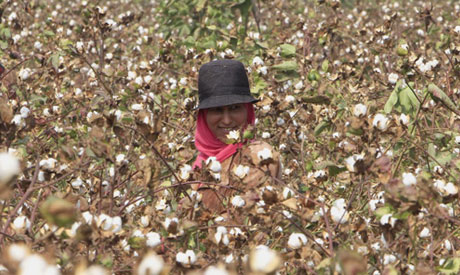
A farmer picks cotton on a farm in Qaha about 25 km (16 miles) north of Cairo, Egypt. (Photo: Reuters)
The Egyptian government has decided to no longer subsidise farmers planting cotton effective the upcoming growing season, potentially ending the production of the world's finest cotton variety.
On Sunday, Agriculture Minister Adel El-Beltagy told the state-run news agency MENA that growing cotton, particularly the long staple variety, is very expensive and there is not much demand for it neither locally nor internationally.
El-Beltagy said that farmers who still want to grow cotton will be on their own when it comes to finding buyers.
The government currently subsidises cotton growers by LE1,400 per feddan (1.038 acres) – an amount that farmers say is still insufficient to reaching profitability – with the total cost hovering around LE420 million ($58m) if multiplied by the number of cotton-planted feddans.
"Removing cotton subsidies means the end of Egyptian cotton," Gamal Siyam, a professor of agricultural economics at Cairo University, told Ahram Online.
"Market prices of cotton are currently low; without the subsidy, farmers will not be able to sustain the cost of planting cotton," he concluded.
Many Egyptian spinning factories have stopped buying Egyptian cotton, El-Beltagy said, despite "pressure from the state" to do so. Local and international manufacturers have abandoned Egyptian long-staple cotton as new technology enables them to extract large quantities of yarn from short-staple varieties, he said.
Cutting cotton subsidies is the latest measure taken by President Abdel-Fattah El-Sisi's government to reduce public expenses. In July, it cut fuel subsidies, raising prices at the pump by up to 78 percent.
Anything but cotton
Egypt's long-staple cotton, the finest in the world, is used in high-quality clothing for its softness and strength. Cotton is cultivated on 333,000 feddans, which constitutes four percent of the country's arable land, according to the latest information from the government-run statistics body, CAPMAS.
The country produced 294,000 metric tonnes of cotton in 2012, a 45 percent drop from the preceding nine-year average, CAPMAS data showed.
Cultivating a feddan of cotton costs about LE11,100 while the average market price of the crop is LE8,500, Hashem Farag, secretary general of Egypt's Small Farmers Union said.
"The subsidy was not enough, but it helped. That is why we have large quantities of unsold cotton, because we will not sell at a loss," he said. "Now farmers will plant anything but cotton; corn, soy beans or even wheat," he said.
Egypt exported $83.8 million worth of raw cotton in 2013/14, down from $120.3 million the year prior, according to Central Bank Data. Imports of raw cotton, however, grew to $117.8 million in the same year up from $51.3 million.
However, Siyam believes that "the problem with cotton production is that feddan productivity is low relative to current international prices, so planting it is not economically viable."
"But these are temporary circumstances,” he added.
Short link: